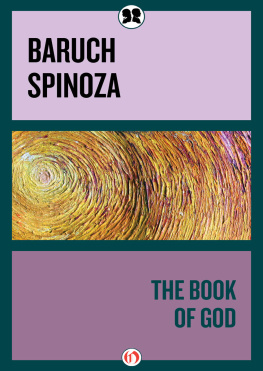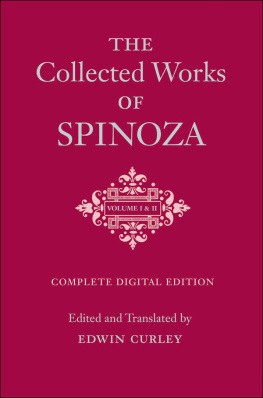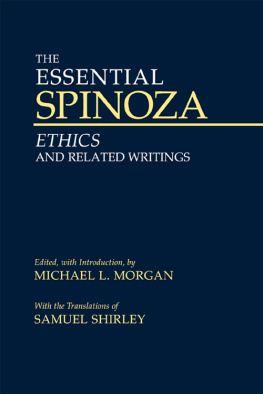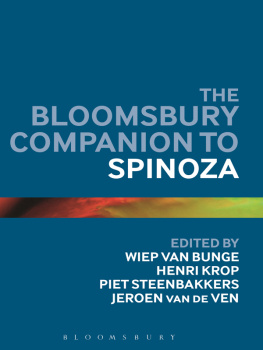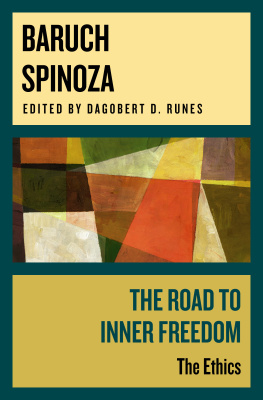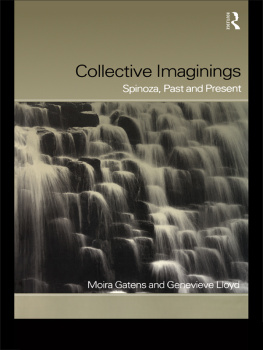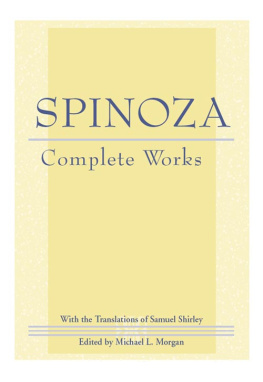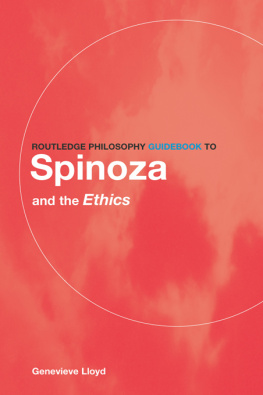The Book of God
Baruch Spinoza

Table of Contents
God Exists
Whatever we clearly and distinctly know to belong to the nature of a thing, we can also truly affirm of that thing. Now we can know clearly and distinctly that existence belongs to the nature of God.
The essence of things are from all eternity, and unto all eternity shall remain immutable.
The existence of God is essence.
We say that God is a being of whom all or infinite attributes are predicated, of which attributes every one is infinitely perfect in its kind. Now, in order to express our views clearly, we shall premise the four following propositions:
1. That there is no finite substance, but that every substance must be infinitely perfect in its kind, that is to say, that in the infinite understanding of God no substance can be more perfect than that which already exists in Nature.
2. That there are not two like substances.
3. That one substance cannot produce another.
4. That in the infinite understanding of God there is no other substance than that which is formaliter in Nature.
The reasons why we said that all these attributes, which are in Nature, are but one single being, and by no means different things (although we can know them clearly and distinctly the one without the other, and the other without another), are these:
1. Because we have found already before that there must be an infinite and perfect being, by which nothing else can be meant than such a being of which all in all must be predicated. Why? [Because] to a being which has any essence attributes must be referred, and the more essence one ascribes to it, the more attributes also must one ascribe to it, and consequently if a being is infinite then its attributes also must be infinite, and this is just what we call a perfect being.
2. Because of the unity which we see everywhere in Nature. If there were different beings in it then it would be impossible for them to unite with one another.
3. Because although one substance cannot produce another, and if a substance does not exist it is impossible for it to begin to exist, we see, nevertheless, that in no substance (which we none the less know to exist in Nature), when considered separately, is there any necessity to be real, since existence does not pertain to its separate essence. So it must necessarily follow that Nature, which results from no causes, and which we nevertheless know to exist, must necessarily be a perfect being to which existence belongs.
From all that we have so far said it is evident, then, that we posit extension as an attribute of God; and this seems not at all appropriate to a perfect being: for since extension is divisible, the perfect being would have to consist of parts, and this is altogether inapplicable to God, because He is a simple being. Moreover, when extension is divided it is passive, and with God (who is never passive, and cannot be affected by any other being, because He is the first efficient cause of all) this can by no means be the case.
To this we reply: (1) that part and whole are not true or real entities, but only things of perception, and consequently there are in Nature neither whole nor parts. (2) A thing composed of different parts must be such that the parts thereof, taken separately, can be conceived and understood one without another. Take, for instance, a clock which is composed of many different wheels, cords, and other things; in it, I say, each wheel, cord, etc., can be conceived and understood separately, without the composite whole being necessary thereto. Similarly also in the case of water, which consists of straight oblong particles, each part thereof can be conceived and understood, and can exist without the whole; but extension, being a substance, one cannot say of it that it has parts, since it can neither diminish nor increase, and no parts thereof can be understood apart, because by its nature it must be infinite. And that it must be such, follows from this, namely, because if it were not such, but consisted of parts, then it would not be infinite by its nature, as it is said to be; and it is impossible to conceive parts in an infinite nature, since by their nature all parts are finite. Add to this still: if it consisted of different parts then it should be intelligible that supposing some parts thereof to be annihilated, extension might remain all the same, and not be annihilated together with the annihilation of some of its parts; this is clearly contradictory in what is infinite by its own nature and can never be, or be conceived, as limited or finite. Further, as regards the parts in Nature, we maintain that division, as has also been said already before, never takes place in substance, but always and only in the mode of substance. Thus, if I want to divide water, I only divide the mode of substance, and not substance itself. And whether this mode is that of water or something else it is always the same.
Division, then, or passivity, always takes place in the mode; thus when we say that man passes away or is annihilated, then this is understood to apply to man only in so far as he is such a composite being, and a mode of substance, and not the substance on which he depends.
Moreover, we have already stated, and we shall repeat it later, that outside God there is nothing at all, and that He is an Immanent Cause. Now, passivity, whenever the agent and the passivum are different entities, is a palpable imperfection, because the passivum must necessarily be dependent on that which has caused the passivity from outside; it has, therefore, no place in God, who is perfect. Furthermore, of such an agent who acts in himself it can never be said that he has the imperfection of a passivum, because he is not affected by another; such, for instance, is the case with the understanding, which, as the philosophers also assert, is the cause of its ideas. Since, however, it is an immanent cause, what right, has one to say that it is imperfect, howsoever frequently it is affected by itself? Lastly, since substance is [the cause] and the origin of all its modes, it may with far greater right be called acting than passive. And with these remarks we consider all adequately answered.
It is further objected, that there must necessarily be a first cause which sets body in motion, because when at rest it is impossible for it to set itself in motion. And since it is clearly manifest that rest and motion exist in Nature, these must, they think, necessarily result from an external cause. But it is easy for us to reply to this; for we concede that if body were a thing existing through itself, and had no other attributes than length, breadth, and depth, then, if it really rested there would be in it no cause whereby to begin to move itself; but we have already stated before that Nature is a being of which all attributes are predicated, and this being so, it can be lacking in nothing wherewith to produce all that there is to be produced.
Having so far discussed what God is, we shall say but a word, as it were, about His attributes: that those which are known to us consist of two only, namely, Thought and Extension; for here we speak only of attributes which might be called the proper attributes of God, through which we come to know Him [as He is] in Himself, and not [merely] as He acts [towards things] outside Himself. All else, then, that men ascribe to God beyond these two attributes, all that (if it otherwise pertains to Him) must be either an extraneous denomination, such as

